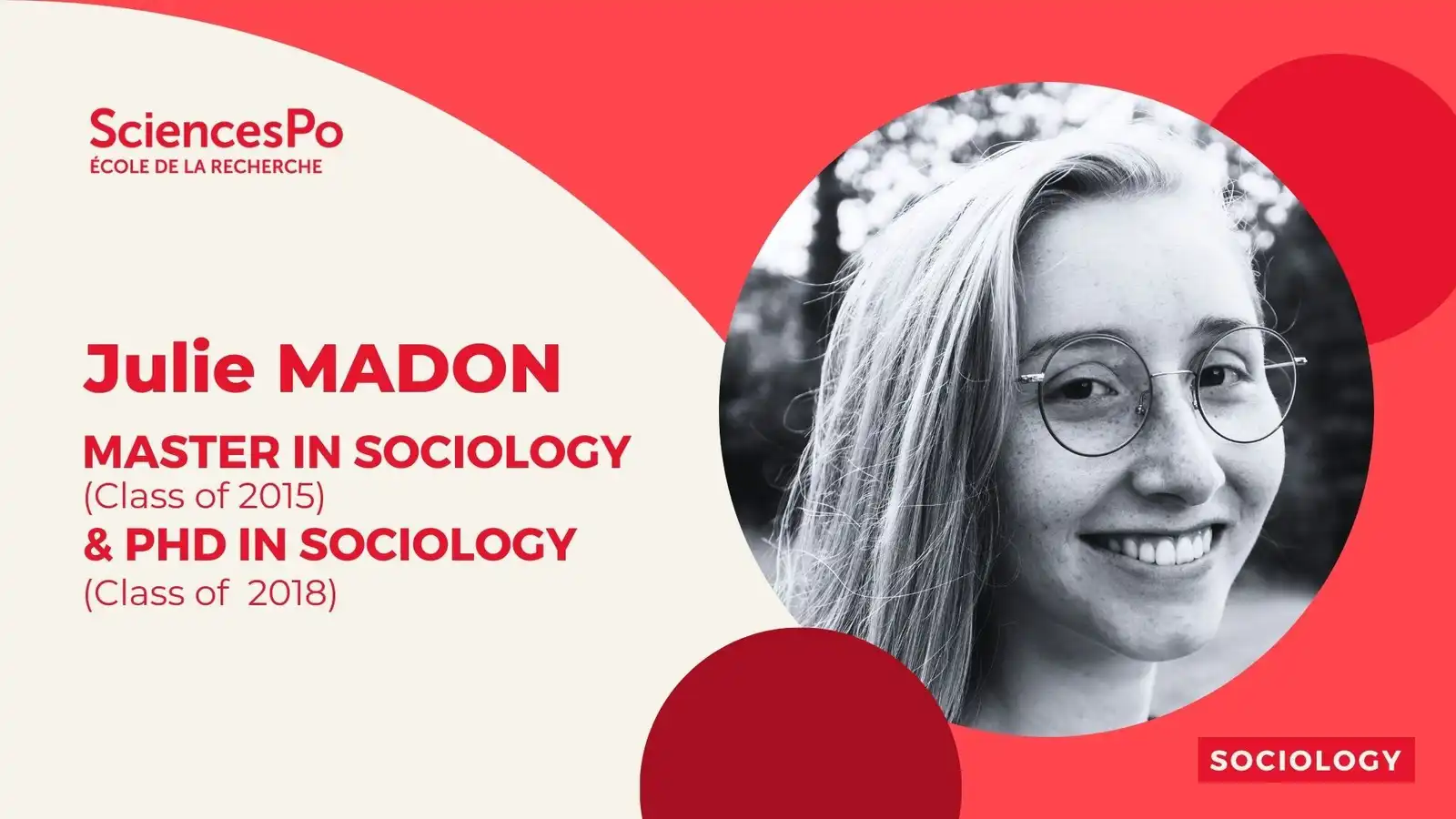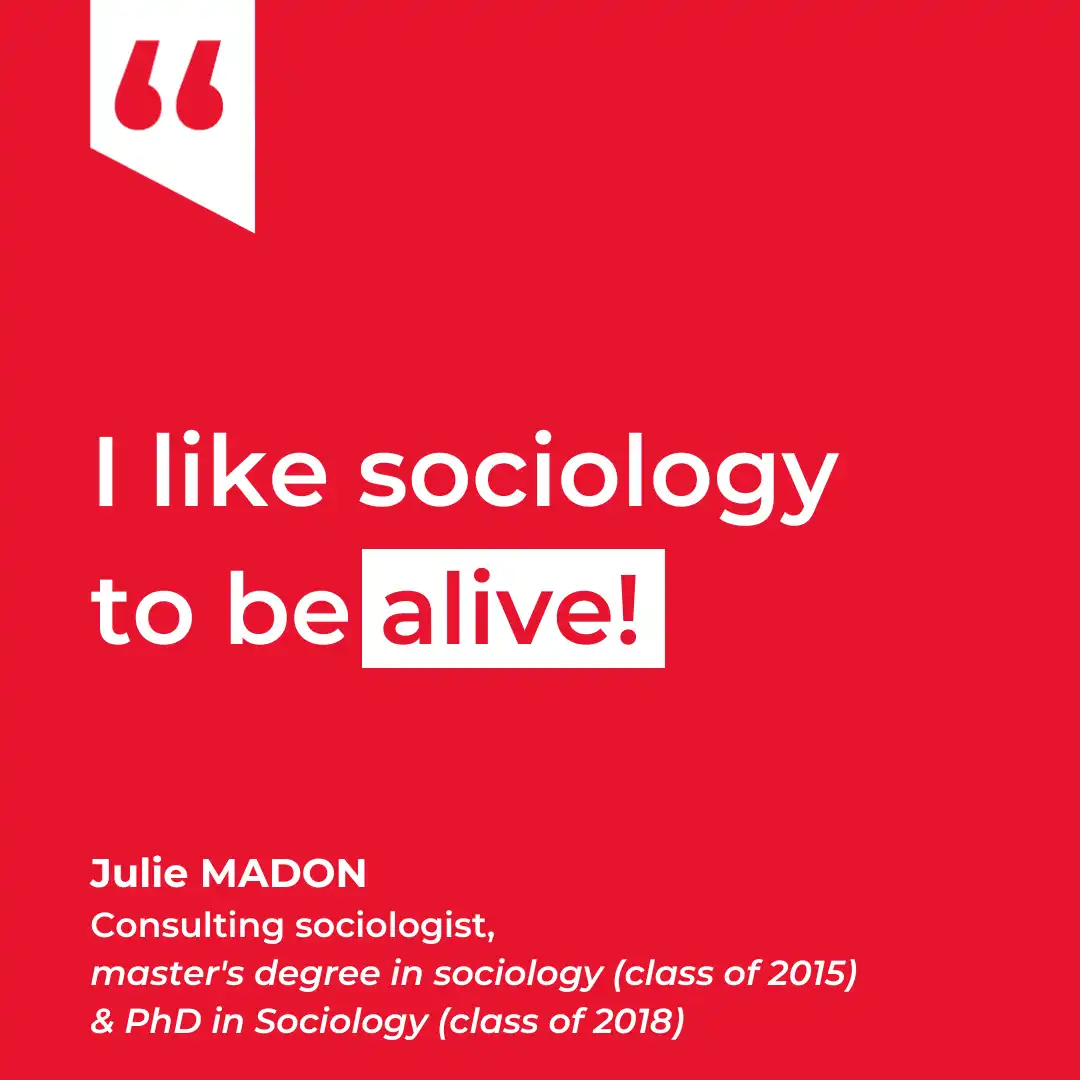Home>Julie Madon, class of 2015
22.01.2024
Julie Madon, class of 2015
COULD YOU TELL US ABOUT YOUR ACADEMIC BACKGROUND? HOW DID YOUR INTEREST IN SOCIOLOGY COME ABOUT?
I discovered sociology in B/L preparatory classes, particularly through Bernard Lahire's book, La Culture des Individus, which fascinated me. This discovery made me want to delve deeper into the subject at university. I went on to complete my bachelor's degree in Sociology, and entered Sciences Po via the competitive entrance exam for the master's programme. I went on to do a PhD, where I worked on how consumers make their objects last.
WHAT DID YOUR ACADEMIC JOURNEY WITHIN THE RESEARCH SCHOOL BRING YOU? WHAT ARE THE MEMORIES FROM YOUR SCHOOL YEARS, YOUR FELLOW CLASSMATES AND TEACHERS THAT STAY WITH YOU TO THIS DAY ?
I remember how happy I was, in both cases, to be surrounded by fellow students who were curious about everything and passionate about the discipline of sociology. I made some very important friends there, who brightened up my student years. I have a vivid memory of my Master 2 dissertation, which looked at environmental practices in a youth movement and an ecovillage. I also really enjoyed getting involved with certain student associations, such as Sciences Potirons, the school's organic and committed vegetable baskets. Finally, I'm still very attached to my laboratory, The Centre for the Sociology of Organisations (CSO), which is both familiar and very welcoming. I've forged strong links with doctoral students, post-doctoral students and full professors.
WHICH TEACHER OR TEACHING HAS HAD THE GREATEST IMPACT ON YOU?
It was probably the qualitative method courses we had with Anne Revillard. It was about doing our first biographical interviews and our first direct and/or participant observations. I loved going out into the field and being guided by such a caring and attentive teacher.
I also have a rather inspiring memory of a presentation I did with some classmates for a course with Alain Chenu: we worked on visual sociology, in other words the use of photography and video in the field. Even today, I'm particularly interested in alternative ways of conducting surveys and reporting the results. I like sociology to be alive!
WHAT IS YOUR CURRENT POSITION OF EMPLOYMENT OR VENTURE ?
Today, I'm a sociologist and consultant with the generalist research company Étéicos. We carry out surveys for a wide range of clients, from Vacances & Familles to RATP, focusing on social and environmental issues. I started working with this company as a Master's student: I had carried out questionnaires for them at the Palais de la Découverte. Then I continued as a freelance during the end of my thesis, before signing a permanent contract today.
HOW DID YOUR ACADEMIC JOURNEY SHAPE YOUR CAREER PLAN ?
The Master gave me methodological tools that I still use today. As for my doctorate, it's a way of being identified as an expert on certain issues. As a result, I've been asked to speak at conferences, answer questions from the media and take on consultancy assignments. My aim, by working on environmental issues and proposing surveys on the subject, is to support the ecological transition of companies and local authorities. I'm still young in this profession, but I hope I'm on the right track!
What advice do you think every prospective student who wishes to follow a career such as yours absolutely needs ?
Don't hesitate to make phone calls. Look on the Internet, on LinkedIn, and as soon as you are inspired by an organisation or a person, ask them for a job interview! Don't hesitate to ask any questions (even indiscreet ones) that pop into your head, to find out about the day-to-day life and working conditions of these professions. It'll help you get an idea of what interests you and what doesn't, as well as building your network. I'm of course available for a chat if you need me.
"Objets Trouvés" podcast with Julie Madon
Julie Madon, a young researcher, presents her sociology thesis on the programmed obsolescence of household goods (electrical and household appliances, furniture, clothing, etc.). She defines what she calls the longevity practices of objects and focuses on individuals and the way they make their possessions last. She tells us the story of an interviewee who discovers new consumer practices far removed from her original social environment.

